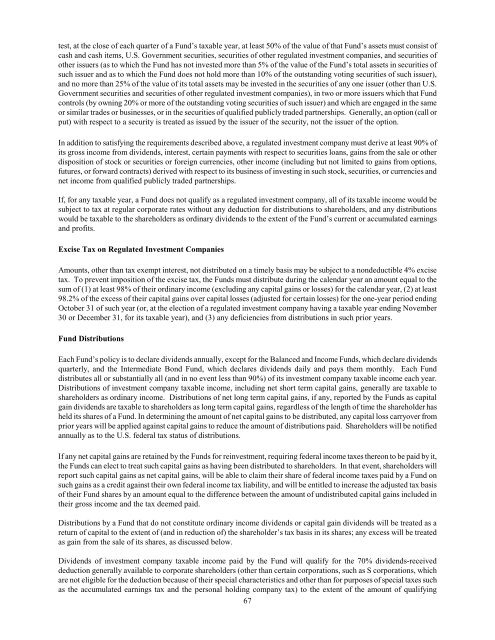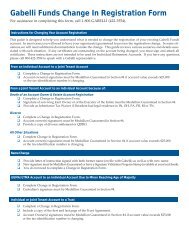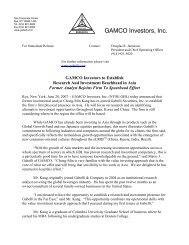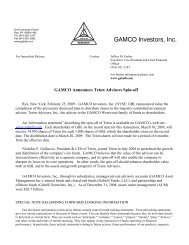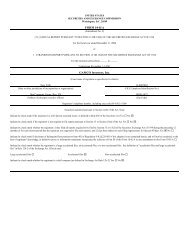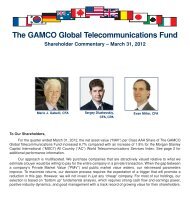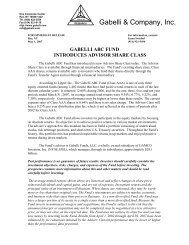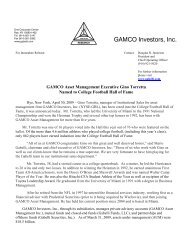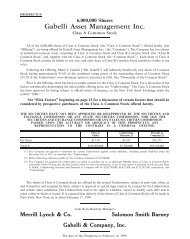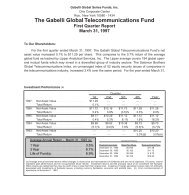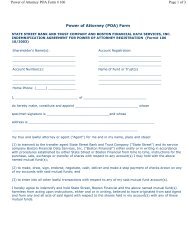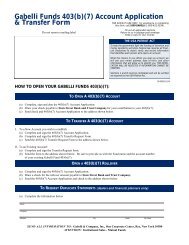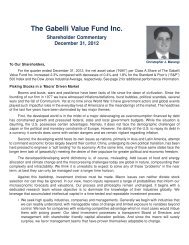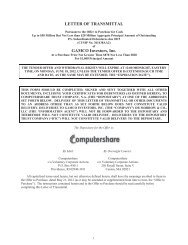Statement of Additional Info - Gabelli
Statement of Additional Info - Gabelli
Statement of Additional Info - Gabelli
Create successful ePaper yourself
Turn your PDF publications into a flip-book with our unique Google optimized e-Paper software.
test, at the close <strong>of</strong> each quarter <strong>of</strong> a Fund’s taxable year, at least 50% <strong>of</strong> the value <strong>of</strong> that Fund’s assets must consist <strong>of</strong><br />
cash and cash items, U.S. Government securities, securities <strong>of</strong> other regulated investment companies, and securities <strong>of</strong><br />
other issuers (as to which the Fund has not invested more than 5% <strong>of</strong> the value <strong>of</strong> the Fund’s total assets in securities <strong>of</strong><br />
such issuer and as to which the Fund does not hold more than 10% <strong>of</strong> the outstanding voting securities <strong>of</strong> such issuer),<br />
and no more than 25% <strong>of</strong> the value <strong>of</strong> its total assets may be invested in the securities <strong>of</strong> any one issuer (other than U.S.<br />
Government securities and securities <strong>of</strong> other regulated investment companies), in two or more issuers which that Fund<br />
controls (by owning 20% or more <strong>of</strong> the outstanding voting securities <strong>of</strong> such issuer) and which are engaged in the same<br />
or similar trades or businesses, or in the securities <strong>of</strong> qualified publicly traded partnerships. Generally, an option (call or<br />
put) with respect to a security is treated as issued by the issuer <strong>of</strong> the security, not the issuer <strong>of</strong> the option.<br />
In addition to satisfying the requirements described above, a regulated investment company must derive at least 90% <strong>of</strong><br />
its gross income from dividends, interest, certain payments with respect to securities loans, gains from the sale or other<br />
disposition <strong>of</strong> stock or securities or foreign currencies, other income (including but not limited to gains from options,<br />
futures, or forward contracts) derived with respect to its business <strong>of</strong> investing in such stock, securities, or currencies and<br />
net income from qualified publicly traded partnerships.<br />
If, for any taxable year, a Fund does not qualify as a regulated investment company, all <strong>of</strong> its taxable income would be<br />
subject to tax at regular corporate rates without any deduction for distributions to shareholders, and any distributions<br />
would be taxable to the shareholders as ordinary dividends to the extent <strong>of</strong> the Fund’s current or accumulated earnings<br />
and pr<strong>of</strong>its.<br />
Excise Tax on Regulated Investment Companies<br />
Amounts, other than tax exempt interest, not distributed on a timely basis may be subject to a nondeductible 4% excise<br />
tax. To prevent imposition <strong>of</strong> the excise tax, the Funds must distribute during the calendar year an amount equal to the<br />
sum <strong>of</strong> (1) at least 98% <strong>of</strong> their ordinary income (excluding any capital gains or losses) for the calendar year, (2) at least<br />
98.2% <strong>of</strong> the excess <strong>of</strong> their capital gains over capital losses (adjusted for certain losses) for the one-year period ending<br />
October 31 <strong>of</strong> such year (or, at the election <strong>of</strong> a regulated investment company having a taxable year ending November<br />
30 or December 31, for its taxable year), and (3) any deficiencies from distributions in such prior years.<br />
Fund Distributions<br />
Each Fund’s policy is to declare dividends annually, except for the Balanced and Income Funds, which declare dividends<br />
quarterly, and the Intermediate Bond Fund, which declares dividends daily and pays them monthly. Each Fund<br />
distributes all or substantially all (and in no event less than 90%) <strong>of</strong> its investment company taxable income each year.<br />
Distributions <strong>of</strong> investment company taxable income, including net short term capital gains, generally are taxable to<br />
shareholders as ordinary income. Distributions <strong>of</strong> net long term capital gains, if any, reported by the Funds as capital<br />
gain dividends are taxable to shareholders as long term capital gains, regardless <strong>of</strong> the length <strong>of</strong> time the shareholder has<br />
held its shares <strong>of</strong> a Fund. In determining the amount <strong>of</strong> net capital gains to be distributed, any capital loss carryover from<br />
prior years will be applied against capital gains to reduce the amount <strong>of</strong> distributions paid. Shareholders will be notified<br />
annually as to the U.S. federal tax status <strong>of</strong> distributions.<br />
If any net capital gains are retained by the Funds for reinvestment, requiring federal income taxes thereon to be paid by it,<br />
the Funds can elect to treat such capital gains as having been distributed to shareholders. In that event, shareholders will<br />
report such capital gains as net capital gains, will be able to claim their share <strong>of</strong> federal income taxes paid by a Fund on<br />
such gains as a credit against their own federal income tax liability, and will be entitled to increase the adjusted tax basis<br />
<strong>of</strong> their Fund shares by an amount equal to the difference between the amount <strong>of</strong> undistributed capital gains included in<br />
their gross income and the tax deemed paid.<br />
Distributions by a Fund that do not constitute ordinary income dividends or capital gain dividends will be treated as a<br />
return <strong>of</strong> capital to the extent <strong>of</strong> (and in reduction <strong>of</strong>) the shareholder’s tax basis in its shares; any excess will be treated<br />
as gain from the sale <strong>of</strong> its shares, as discussed below.<br />
Dividends <strong>of</strong> investment company taxable income paid by the Fund will qualify for the 70% dividends-received<br />
deduction generally available to corporate shareholders (other than certain corporations, such as S corporations, which<br />
are not eligible for the deduction because <strong>of</strong> their special characteristics and other than for purposes <strong>of</strong> special taxes such<br />
as the accumulated earnings tax and the personal holding company tax) to the extent <strong>of</strong> the amount <strong>of</strong> qualifying<br />
67


